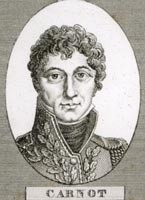Fact file
Born Nolay (Burgundy, France), 13 May, 1753, died Magedeburg (Saxony, Prussia [Germany]) 22 August, 1823
Son of a lawyer (and notary) in the Parlement de Dijon
Capitaine du Génie during the Constituante period of the Revolution
Married Sophie Dupont (sister of his younger brother's wife) who brought him a comfortable dowry of 30 000 livres
During the Législative and the Convention – Député for the Pas-de-Calais region
Nominated member of the Grand comité de Salut public 1793-1795 during the Terreur
Député aux Anciens during the Directory
Exiled after the Fructidor coup d'Etat (his consequently vacated place in the Institut, which he had held since its inception, was taken by Bonaparte himself)
Received authorisation to return to France after Brumaire in 1799
Inspecteur général des armées, 7 February 1800
Minister for war from 2 April 1800 until his resignation on 8 October 1800
Tribune from 1802 until its dissolution on 19 August 1807
Governor of Antwerp 1814
Surrendered to Louis and the first restoration, 3 May 1814
During the Hundred Days, Carnot was appointed Archichancellier and Minister of Justice.
Made Comte de l'Empire by the decree of 20 March 1815 and thus entered the Chambre des Pairs des Cent-Jours
Member of the executive committee after Waterloo
Proscribed by a law of 24 July 1815
Lived in retirement in Warsaw and subsequently Magdeburg
After initial schooling at the Petit séminaire in Autun, Carnot went to the engineering military school, the Ecole du Génie de Mézières. His first career was as a second lieutenant engineer – he was to rise to the rank of General. Like Cambaceres and Fouché, but unlike all the other Napoleonic ministers, Carnot was one of the 'regicides' and had even sat on the Grand comité de Salut, the guiding body of the Terreur. He was on the other hand clearly in favour of the Thermidor coup which brought about the downfall of Robespierre and Saint-Just. His early successes in 1793/4 include the reorganisation of the Armée du Nord (victories at Wattignies and Maubeuge) and the creation from scratch (with Robert Lindet and Prieur de la Côte d'Or) and logistical support of eleven armies. The resulting crushing victory at Fleurus 26 June 1794, and the subsequent invasion of Belgium, Rhenanie and Holland (all made possible by Carnot's work) led to his being known as the ‘organiser of victory'. During the Directory Carnot was a member of the Chambre and subsequently became one the Directeurs, and he was essentially occupied with war matters. It was at then that he came into contact with Bonaparte. He was exiled after the Fructidor coup of September 1797 because he had (with the new director of the Cinq-Cents, Barthélemy) preferred to respect as he said the will of the people and their apparent Royalist tendencies revealed in the election to the Cinq-Cents of a majority of crypto-royalists and the president in the form of General Pichegru. Pardoned by Bonaparte on 26 December 1799 in the wake of the Brumaire coup, he returned to Paris on 19 January 1800. His brief term as minister for war ended in October of the same year and he retired to St-Omer. During his period as a Tribune he frequently opposed Napoleon, voting against the establishment of the Legion of Honour, the consulate for life and the establishment of the Empire (the only Tribune to do so). After a seven-year break from politics, he offered his services to Napoleon during the Campagne de France and was made governor of Antwerp. During the First Restoration, Carnot only finally rallied to Louis (before going into retirement), but not before Napoleon had abdicated and Carnot had carefully negotiated the surrender of Antwerp. He left Paris in the October of 1815 eventually dying in Magdeburg in Prussian Saxony.
Further reading
Lentz, T., Dictionnaire des ministres de Napoléon, Paris:Christian/JAS, 1999
Dhombre, J., and N., Lazare Carnot, Paris, 1997
Rheinhard, M., Le grand carnot, Paris, 1952, 2 vols.
Dupre, H., Lazare Carnot, Republican Patriot, Philadelphia: Porcupine Press, 19401, 19752
Gillispie, C. C., Lazare Carnot Savant, Princeton, N.J., Princeton University Press, 1971
The Encyclopedia Britannica Online, Carnot


